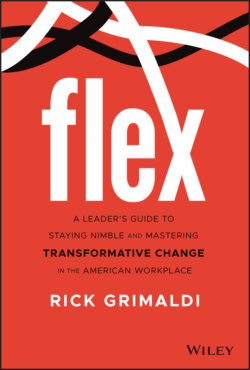Читать книгу FLEX - Rick Grimaldi - Страница 7
PREFACE
Оглавление“What do you do for a living?”
It's one of the very first questions most of us ask in a casual conversation with a new acquaintance. That's because, for most of us, work is at the epicenter of our lives. It informs our identity. Understanding another's métier provides quick insight about someone. After all, work is how we feed our families and fund our dreams.
And if we're very fortunate, it feeds our creativity and sense of purpose and accomplishment in the world. For better or for worse, work is a defining characteristic of our lives.
But here's the thing: The world of work is changing rapidly and in new and unprecedented ways. And that change is occurring faster than ever before. Truths about workers and what they want in a job—things that have seemed self-evident up until now—are just no longer true.
Those who are leading for tomorrow understand this seismic shift. They recognize that their success is predicated on recruiting a skilled workforce as well as their ability to engage and retain those workers in service of the company's goals in the years ahead.
Those who ignore these trends do so at their own peril and will lose the war for talent (and thereby risk their business) in the coming years. Never has it been so urgent to put a finger on the pulse of trends shaping tomorrow's labor force and respond quickly.
We're living in an age when a company's good reputation can fizzle fast with a single viral Facebook post or cringeworthy Glassdoor review. As a labor attorney and employee relations specialist, I've worked with dozens, if not hundreds, of companies that have fought with unions, suffered expensive lawsuits, treated their employees poorly, and lost lucrative business to competitors as a result.
However, I have also been privileged to work with companies that really get it. They recognize the value of calibrating their business to what matters most to employees. They actively work to hire and maintain a diverse workforce. And they are leaning in to experiment with new ways to adapt to the changing needs of the world. The market has rewarded these companies.
Forward-thinking leaders keep close tabs on the many implications of the ever-evolving world of work and reshape their policies and procedures with creative solutions that work for everyone.
That's a mission-critical skill today with the whirlwind of changes remaking the landscape of work. Just consider the stratospheric rise of the gig economy. Is it a good thing for tomorrow's organizations? A bad thing? The gig economy's not going anywhere soon so businesses must understand that the next generation of talent is no longer motivated by “30 years and a watch.”
Plus, the advent of new technology is now expanding the economic pie for some even as it unemploys and underemploys others. Assistive technologies are enabling more people with disabilities to join the workforce just as factories are trading out their unskilled workers on the factory floor for college-educated individuals who can run computers. What will this mean for vast populations of workers who can no longer work?
That depends on the commitment and creativity of the companies who employ them. Will you be part of the solution?
